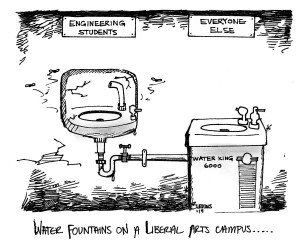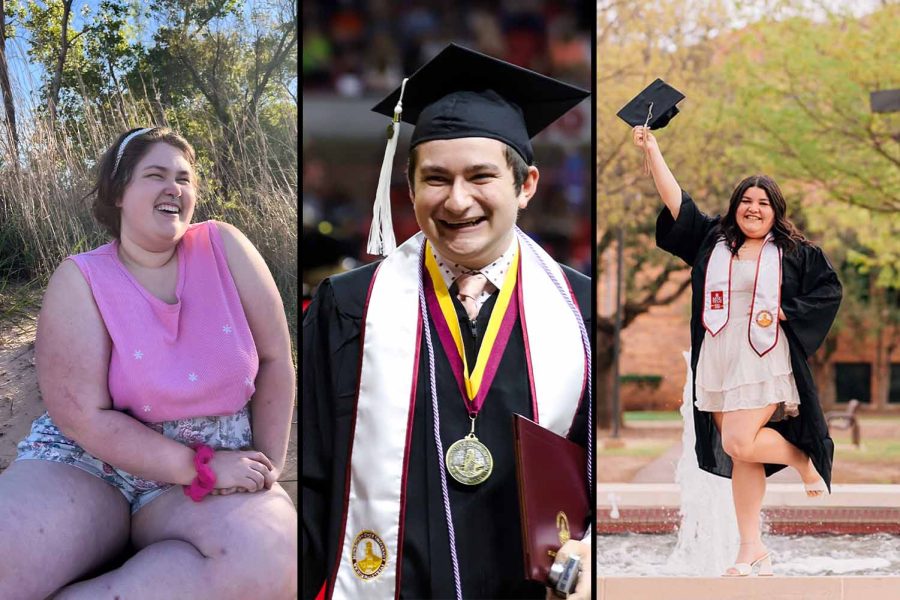 MSU has an illustrious history of providing excellent engineering education to students in this area thanks to the vision of Jesse Rogers and a group of local engineers and entrepreneurs. As the chair of the McCoy School of Engineering, I am proud to confirm that our graduates function at a high level of responsibility both individually and in teams. Our engineering graduates also possess the skills and knowledge to pursue advanced studies as well as assume leadership roles along diverse career paths with a strong appreciation for and commitment to ethical, societal, environmental and professional responsibilities. In addition, they typically exhibit excellent oral, written and visual communication skills.
MSU has an illustrious history of providing excellent engineering education to students in this area thanks to the vision of Jesse Rogers and a group of local engineers and entrepreneurs. As the chair of the McCoy School of Engineering, I am proud to confirm that our graduates function at a high level of responsibility both individually and in teams. Our engineering graduates also possess the skills and knowledge to pursue advanced studies as well as assume leadership roles along diverse career paths with a strong appreciation for and commitment to ethical, societal, environmental and professional responsibilities. In addition, they typically exhibit excellent oral, written and visual communication skills.
Consider the following.
- We have more than 250 mechanical engineering majors in our programs.
- We just established a petroleum engineering certificate Program.
- The first Introduction to Petroleum Engineering class was offered in fall 2013 with 24 students and is now being offered again in spring 2014 with around 20 new students.
- The degree in manufacturing engineering technology was accredited by the Technology Accreditation Commission of the Accreditation Board of Engineering and Technology in 1989.
- Many graduates from this program over the past two decades are now moving into engineering managerial positions in various firms.
- One of the first graduates of the engineering programs, Michael Pepper, is now the president of Alcoa Power and Propulsion and supervises nearly 20 facilities such as Howmet in Wichita Falls.
- In 2009, the newly established bachelor’s in mechanical program was accredited. Within a short period of time, we have had graduates from this program pursuing advanced degrees at University of California — Berkeley, University of North Carolina and numerous other institutions. Our graduates continue to thrive in the Army Corp of Engineers, Alcoa Howmet, Texas Department of Transportation and many other engineering firms in the State of Texas and the nation.
What is the secret of success of this relatively young and small engineering program in a liberal arts oriented university?
First, we do have a group of hard working and caring faculty members. I have been teaching and conducting research for more than 14 years in research oriented institutions in the states before I joined MSU in 2009. I have never seen a group of faculty members working so hard. They even show up on weekends. The dedication and enthusiasm of the faculty sets a good example for the students. Faculty members help each other, learn from each other, and whenever there is a need, they also cover each other’s teaching responsibilities. Engineering students naturally learn from their experience that the engineering profession is a team profession. Faculty members also do not shy away from learning new tools and gadgets. They set a wonderful example for life-long learning attitude and habits.
Second, our engineering programs reside at a liberal arts oriented university so our engineering students naturally make friends with students majoring in a variety of other fields. This association helps our engineering students break the traditional model of engineering education at science and technology oriented universities. They pay more attention to the ability to function on multidisciplinary teams and acquire the ability to communicate effectively. Consequently, they appreciate and gradually develop so-called soft skills that are becoming increasingly essential in today’s engineering fields.
With the recent development in nano and micro-scale science and engineering as well as quantitative understanding of biological systems and other complex systems, the boundary between science and engineering research is getting blurred. Engineering education is becoming more and more multidisciplinary and dependent on basic sciences and mathematics. Many areas of research are rapidly advancing due to the combined efforts of science and engineering. In some cases, fields of research that were stagnant under the exclusive domain of one discipline have been rejuvenated with new discoveries through collaboration with practitioners from other disciplines. Housing the McCoy School of Engineering within the College of Science and Mathematics might also be a plus for us to pursue this multidisciplinary engineering education model. The close association with faculty members in mathematics and basic sciences does help engineering students to navigate through the strict requirements in these areas.
This year we will welcome back another team of ABET evaluators. They will see an increase of enrollment and retention rate. They will also see a newly expanded McCoy Engineering Hall with up-to-date, first-class equipment. They will also discover the environment conducive for the natural development of soft skills essential for engineers in the 21st century. The engineering programs should continue to provide comparable engineering education with an affordable tuition. Our engineering students nurtured in a liberal arts education environment will work well with others from many disciplines, perform well in teams, and have a distinct advantage in the corporate world.







